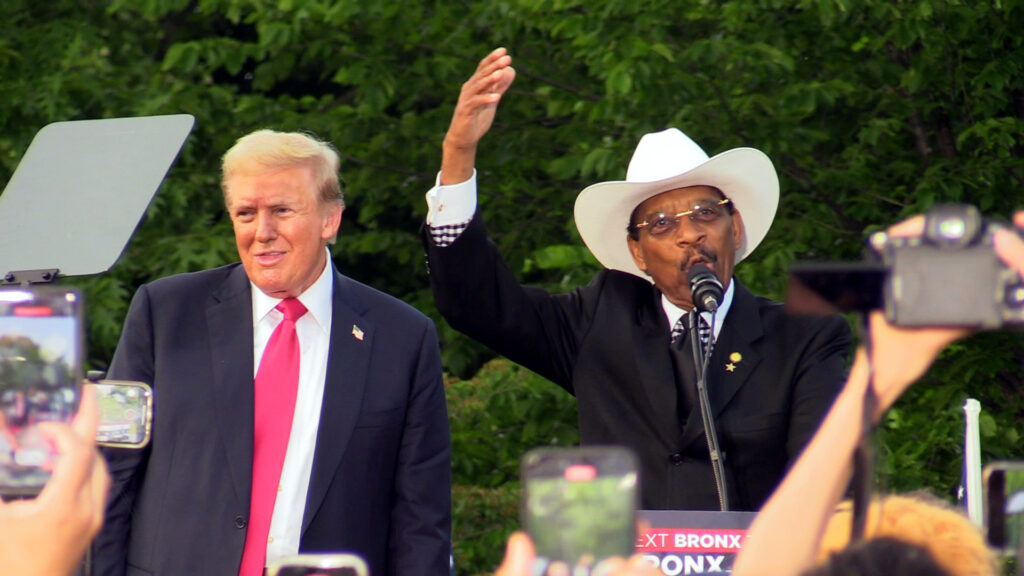
Photo by David Greene.
Editor’s Note: The following is an extended version of the story that appears in our latest print edition.
Two days after the defense rested its case in the historic criminal trial held in Manhattan of former U.S. President Donald Trump over his alleged falsification of business records ahead of the 2016 presidential election [and in which Trump was found guilty on all 34 counts on May 30], the former president held a rally in The Bronx’s Crotona Park on Thursday, May 23. Trump continues to maintain his innocence despite the guilty verdict.
As a steady stream of supporters wearing red MAGA [Make American Great Again] hats and t-shirts and carrying Trump and American flags slowly streamed through security checkpoints, “Laverne,” a neighborhood resident, was crossing Prospect Avenue at Boston Road. “F—k Trump!” Laverne fumed. “He doesn’t need to be in office; he needs to be disqualified – period! He breaks a lot of laws and gets away with it.”
Meanwhile, Castle Hill resident Shaheem Folomon was seen patiently waiting in line to enter the rally, holding a New York City vanity license plate that read, “Donald Trump.” He told us, “I’ve been with daddy since the ‘80s. I saw him when he was a young man. I was a little kid. I wanted him to be president.”
Asked why he supported Trump, Folomon replied, “Because he has done more for the Black race than the Black race has done for themselves. People in my family don’t like me anymore. I don’t care. I’m with him; he is my family.”
“Crockett,” a man selling t-shirts for $20 each, said he worked for “Brothers for Trump,” based in Cleveland, Ohio. He said he and his fellow workers follow Trump to all his rallies. Asked how business was in The Bronx, he replied, “Pretty good; Trump keeps people working. Trump’s my hero.”
Before Trump’s arrival on what was quite a low stage area, other speakers included Andrew Giuliani, son of former NYC Mayor Rudy Giuliani, Madeline Brame, whose son, Hanson Correa, 35, had been stabbed to death in Manhattan in 2018, and former Bronx city councilman and State senator, Rev. Ruben Díaz Sr..
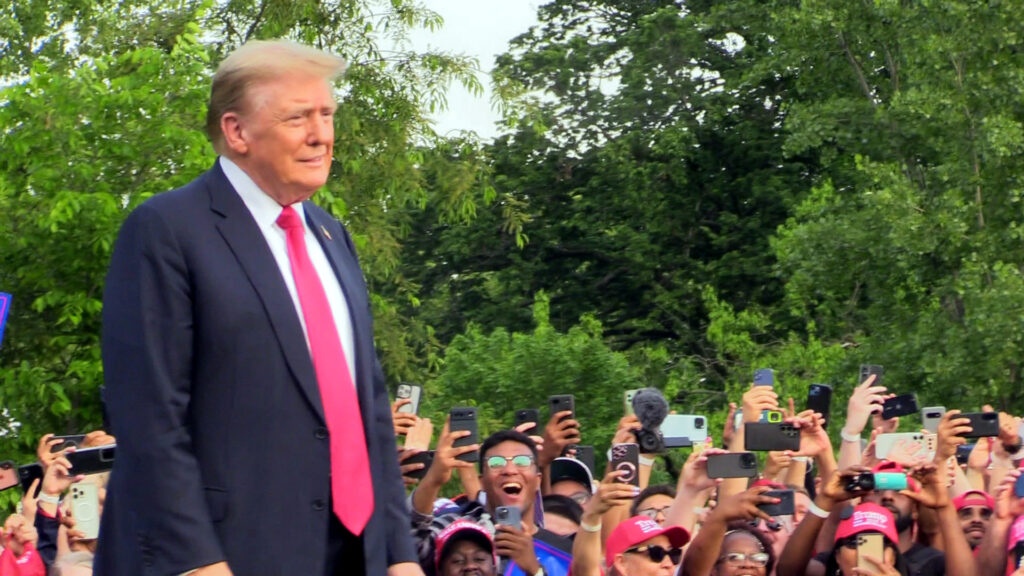
Photo by David Greene
Díaz Sr. told the crowd, “Donald Trump, what he has done today, unite The Bronx.” He added, “No one has ever come to The Bronx like this.” Trump later greeted supporters, saying, “Hello New York City and hello to all the incredible, tough, strong, hard-working American patriots right here in The Bronx.”
The former president stuck to his usual talking points, focusing on crime, illegal immigration, the state of the public education system, and of the roads and subways, saying only he could turn things around. “The city has given us so much, and now it’s time that we are going to give it back,” Trump said. “Together, we are going to make New York City great again and simultaneously, we’re going to make America great again.”
The crowd responded with chants of “U-S-A!” Trump later said that “as soon as” he was elected president, he would call both the governor and the mayor of New York to work with them. Many Democrat leaders had already denounced his planned visit to the borough. Later, seemingly in an attempt at unity, Trump said, “It doesn’t matter if you’re Black or brown, or White, or whatever color you are; it doesn’t matter. We are all Americans, and we’re going to pull together.” Once again, the crowd broke out into spontaneous chants of “U-S-A!”
While recounting how he stepped in to finalize the long-delayed Wollman Skating Rink project in Central Park and recalling its opening which he said his parents attended, Trump jumped off topic at one point and referenced his Manhattan trial. “My parents were there,” he said of the ice rink opening. “Now, they’re looking down on us. They say, ‘Wow! That’s my son! Can you imagine? He came right into court with a crooked judge, a highly conflicted judge at that.”
Of the Crotona Park crowd size, Trump said, “You know, when I called for this rally, they said, ‘Let’s just have a meeting. Don’t call it a rally,’ and so many people showed up. Like it or not, this is a rally!” According to USA Today, the rally had a permit for 3,500 people. The section closest to the stage was restricted, and there were crowds further away from this section who didn’t get in.
Trump once vowed to be surrounded by the “best people.” Yet, many in his inner circle were later charged with various crimes. His former chief strategist, Steve Bannon, was convicted for contempt of Congress, and Trump’s former national security advisor, Gen. Michael Flynn, was charged with lying to the FBI about conversations with Russian diplomats before Trump formally took office in January 2017. Trump ultimately pardoned Flynn.
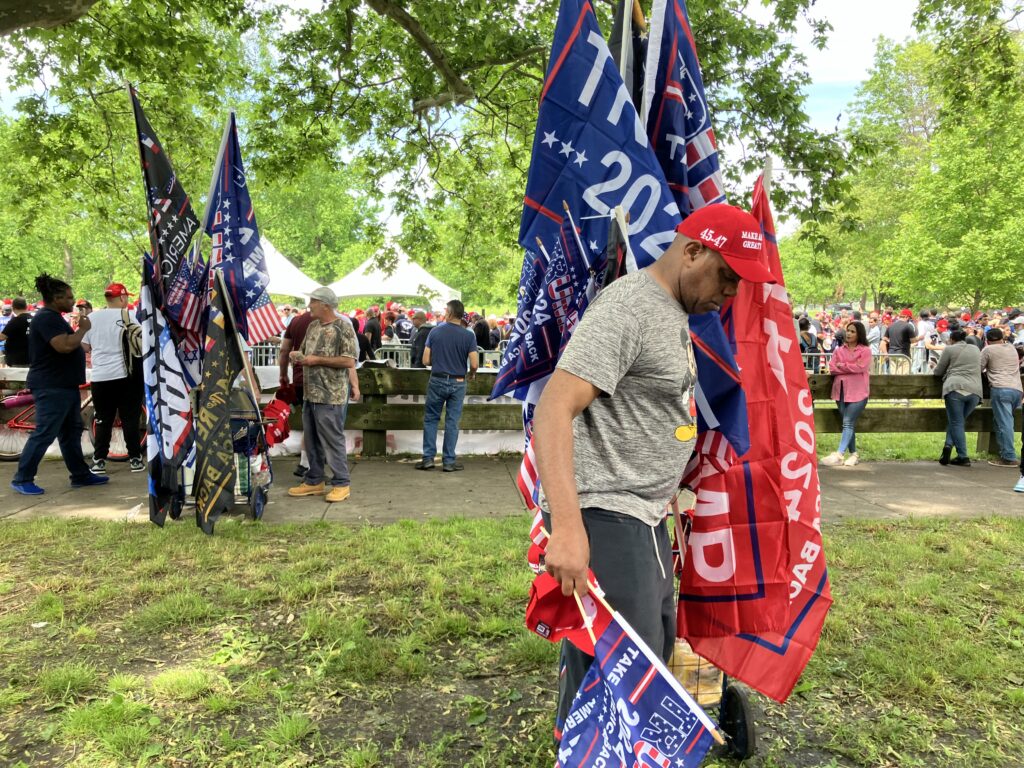
Photo by David Greene
“We had great people, but we also had some people I wouldn’t have used if I had my choice,” Trump said at the rally of his former colleagues. “Now I know everybody. I know the smart ones. I know the dumb ones. I know the killers. I know the weak ones. I know them all.” The crowd then broke out into a chant of “Drain the swamp!”
Trump invited rappers Sheff G and Sleepy Hallow on stage at one point. Both have been charged in Brooklyn, among others, on various gang-related felony charges. It is unknown if Trump knew of their impending case or not. Both are presumed innocent unless and until convicted in a court of law.
Former Republican Congressman George Santos, who represented parts of Long Island before he was expelled from Congress last year by his peers, was seen talking to a camera at the rally at one point, and also gave several interviews and mingled with the crowd outside the rally.
Norwood News, meanwhile, also spoke to rally attendee, Melissa Vitelli, from Brooklyn, who [for context] appeared to be a White voter and possibly around 30 years of age. We asked Vitelli why she decided to attend the rally. “Brooklyn people never go to The Bronx, so it’s very important,” she said. “Trump has done everything for all types of Americans, and he doesn’t deserve what’s happening to him so it’s only right that we all show up.”
Asked for her thoughts on the evidence against Trump presented in Manhattan Criminal Court in relation to the alleged falsification of business records, Vitelli said, “Even if he does get convicted, we will vote him in and he will run from jail.” [As above, Trump was subsequently found guilty by 12 jurors on May 30 on all 34 counts of falsifying his business records ahead of the 2016 election.]
We asked Vitelli if she had any issues with somebody being indicted and convicted running for office. She replied, “I mean, the Left doesn’t have issues with criminals, so why should we?” Asked if she wanted to expand on her point, she said, “No. We know that they have been attacking him since the second he stepped on, and it’s just because they’re scared of him, and they should be scared of what’s going on here.”
In terms of policy, we referenced how the 2017 Trump Tax Cuts mostly benefited higher income earners and asked for Vitelli’s views on this. “Well, I saw more money in my paycheck so I don’t think that’s true,” she said. We asked Vitelli if she was referring to the stimulus payments paid to households under the Coronavirus Aid, Relief, and Economic Security Act, a bill passed by the then Democratically-controlled Congress and signed into law by then President Trump on March 27, 2020, in response to the economic fallout of the pandemic.
“No, because I got screwed during COVID, being a healthcare worker,” she said. “He is for equality and not equity, and that’s politics, personality, politics, race, sexual orientation. He wants Americans to be American and give the right for everyone to be equal.” On the topic of equality, we mentioned Trump’s support of Florida Gov. Ron DeSantis’ so-called “Don’t Say Gay” bill, and asked Vitelli for her thoughts on it. “I also support that, even though I am gay, right?” Vitelli said. “Because it’s not a ‘Don’t Say Gay’ bill. It’s a ‘Don’t Say Straight’ bill as well. It’s for adults to stop speaking sexually to children. So, just taking one part of it and trying to create a narrative is dangerous, and I’m against that.”
In the context of kids who are potentially questioning their sexuality or kids who are perhaps being bullied because maybe they’re a little bit different, we asked Vitelli if she didn’t think it was a good idea to talk to kids about this in order to help them figure things out. “When I was growing up – I’m an ’80s baby – we weren’t taught about it,” Vitelli said. “I went to a Catholic school for 12 years. It was actually frowned upon and I’m fine. So, I think people will figure it out for themselves, and I also had to let my family deal with it the way they had to. I didn’t force them to like it and it takes time, and that’s what everyone has to understand.”
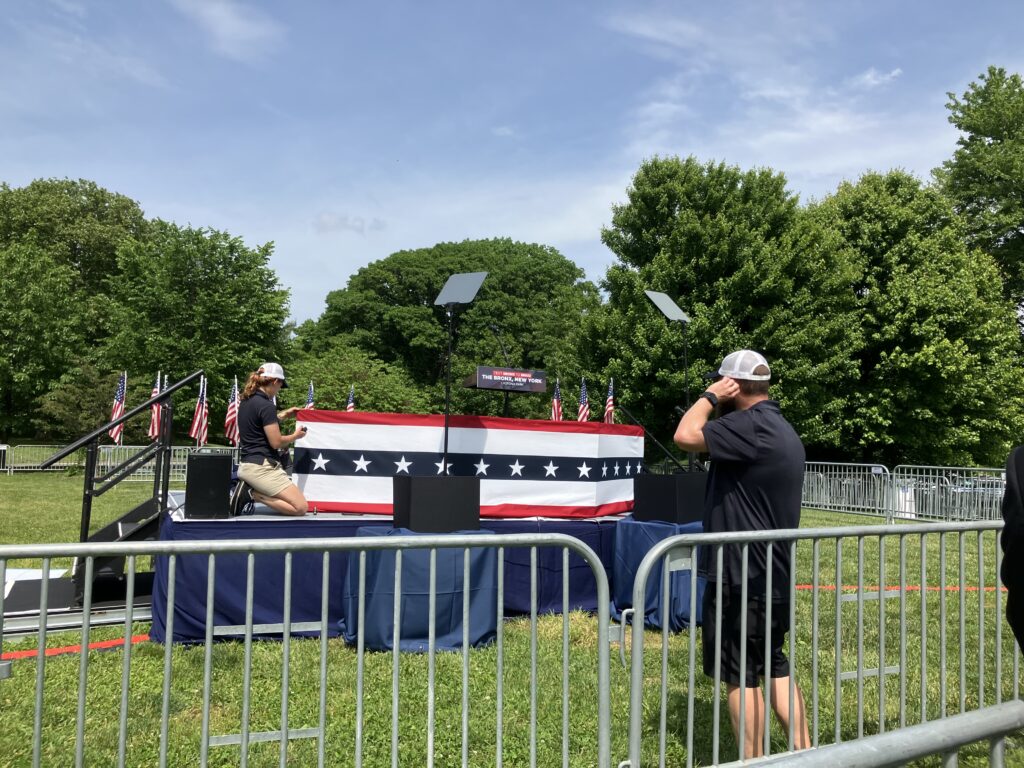
Photo by David Greene
We asked Vitelli if the reason she supports Trump is for his personality and if she felt like he was being unfairly attacked, or if it was more about his policies. “It’s policy,” she said. “It’s literally putting America first, putting tariffs on other countries so they stop draining us of our money. Other countries take advantage of us. The border is a big problem. Living in New York, you see it every day and I just like that he doesn’t stop. He won’t stop. He’ll do whatever he can no matter what they throw at him.”
Given that both immigration and illegal immigration are issues all countries face, and given that they have been exascerbated by the wars in Ukraine and the Middle East due to people fleeing the wars, we asked Vitelli if she believed there was an onus on all countries, collectively, particularly the richer ones, to step up and help those fleeing war or danger.
“They [other countries] never do,” she said. “It’s always us, with money. We are the biggest donator of when any other country is in a war. Did they help us when we were in a war?” We mentioned that a large number of refugees have been taken in by Europe since the beginning of the invasion of Ukraine by Russia. According to statista.com, around six million Ukrainian refugees were registered across Europe, including around 1.1 million by Germany alone, and 6.5 million worldwide as of February/March 2024. Vitelli said the situation with refugees was different from “illegal crossings.”
We also spoke to Walter Mejia, president for New York Republican Latinos, who lives on Long Island and who was estimated to be aged between 20 and 30. We asked him why it was important for him to attend the rally. He said essentially it was because he wanted to counter the narrative that “Latinos are not for Trump.” Mejia explained, “He’s very pro Latino, very pro Latino in the sense of public policy, economic policy. The days were a lot better economically for our community [under the Trump administration].”
On the topic of crime, Mejia went on to say, “It [New York City] used to be one of the safest cities. Now, not so much. You take the subway, and you’re scared for your life. The crime is happening in the minority communities with the Blacks and the Latinos, not in the rich neighborhoods.” We asked Mejia if he had been offended by Trump’s previous comments about Mexicans in 2016 when he said, ““They are not our friend, believe me. They’re bringing drugs, they’re bringing crime, they’re rapists and some, I assume, are good people.”
In response, he said in part, “I’m an immigrant. I came here in 2006. My parents came with luggage and clothes, and that’s it for the American dream. As an immigrant and as a community leader for the Latinos, what I can say is that it’s not fair what’s happening when people are coming across the border, especially being a Salvadorian.”
Mejia explained that years before Nayib Bukele became El Salvador’s current president (described by political analysts as a populist and conservative), the country was, next to Venezuela, an unsafe one and said he believes strongly in public safety. “We want to make sure that people that are coming across the border are not bringing drugs or not bringing crime, and are not gang members,” he said. “That’s not what we want for our country, the United States of America.”
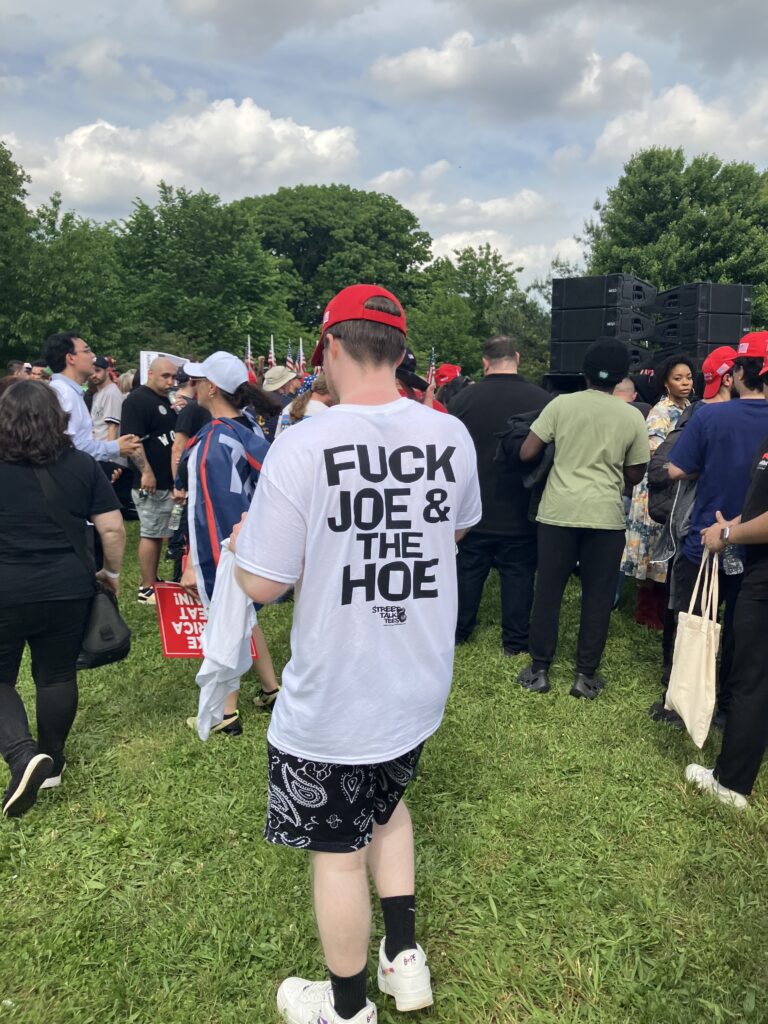
Photo by Síle Moloney
On the topic of immigration, we asked Mejia if he had sympathy for the plight of people fleeing conflict situations. “Of course. I’m a Christian at the end of the day, right?” he said. “And one of the things the Bible says is treat an alien among you as you ought to be treated, right? Like for Israel. But what I can say about this is that for the people seeking asylum, of course America wants to take anybody. The immigrants don’t want to go anywhere else. They want to come to the United States, and they should.”
Mejia said what he wants is for American citizens like himself to be given priority. “Not to get handouts when people are coming across on asylum status, right? I’m paying taxes. I’m paying a mortgage. The interest rates are high. Our veterans are on the street.” We mentioned that for people fleeing a war, they flee with the bag on their back and don’t usually have anything so if they are not allowed work, they have to eat and sleep somewhere [or they may die]. Mejia argued that it’s the same everywhere, saying that in El Salvador, for example, if Salvadorians were asked “to fund” asylum seekers, they would be upset because they already have a lot of domestic issues they have to deal with.
“We can’t be helping out other countries and other people unless we help our people first,” he said, adding, “Economically, the United States is just a mess right now. We got to make sure that people aren’t sleeping in the subways, that they get off the street, we provide them economically with the right tools and get them back in society to work.”
On the topic immigration, he said Republicans are always “accused of not wanting immigration reform.” He talked of asylum seekers being turned away and being told by judges to come back in two or three years. “That’s not how the process should be,” he said. “We want to make sure that we’re keeping everybody safe in our country first and foremost, but we want to also make sure that our immigration process is under some common sense status. Fix the system.”
We asked what such a common sense policy would look like. “For a long time, the American public, especially Latinos, we’ve been asking for this immigration reform,” he said. “It doesn’t mean giving citizenship to millions of undocumented migrants. What it means is for our government [Democrats and Republicans] to come together, have this discussion about what we’re going to do with the people that are currently coming in, because the process that we have right now is a huge mess,” he said in part.
Given the immediate need to process people who are fleeing war or danger, we asked Mejia if, in the short-term, he believed the United States should refuse asylum seekers food and shelter. “Right now, America wants to provide for everybody, right? This is the land of the opportunity and freedom. I get it. People are coming in here, because they’re looking for economic opportunity. They’re coming for shelter. They’re coming for a new life.”
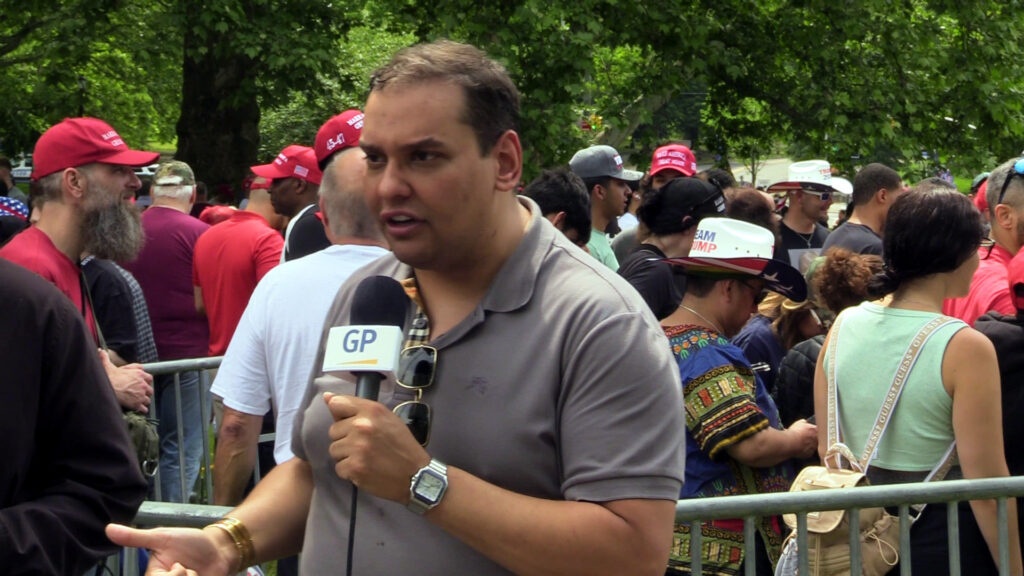
Photo by David Greene
Mejia said that nonetheless he believed the reason Trump was holding the rally in New York City was because “our urban centers, our infrastructure, our bridges, our roads are crumbling,” referring again to American citizens “sleeping on the subways.” We mentioned the passage of President Joe Biden’s infrastructure bill and asked Mejia if he supported it. He suggested that the bill was a nice title but questioned the evidence of its implementation in New York City. “How come the infrastructure is still horrible?” he asked, adding that tolls, for example, on the Verazano Bridge have increased, and lamenting that the Japanese have faster trains and better transportation than in the United States.
According to a White House fact sheet, to date, $22.7 billion in Bipartisan Infrastructure Law funding has been announced and is headed to New York with over 515 specific projects identified for funding. “Since the Bipartisan Infrastructure Law passed, around $18.6 billion has been announced for transportation – to invest in roads, bridges, public transit, ports and airports – and roughly $1 billion has been announced for clean water and water infrastructure,” a fact sheet extract read.
Also according to the fact sheet, New York received $1.6 billion to connect everyone in the State to reliable high-speed internet, with more than 1,792,000 New York households saving on their monthly internet bill. “Many more projects will be added in the coming months, as funding opportunities become grant awards and as formula funds become specific projects,” a fact sheet extract read.
We referenced the various, gradual upgrades made so far, and the ongoing upgrades planned for different Bronx subways. Mejia conceded that “Rome wasn’t built in three days.” He argued nonetheless, “The European Union has better transportation systems [than] we do, and here in America, we’re supposed to be the strongest economy on the international stage.”
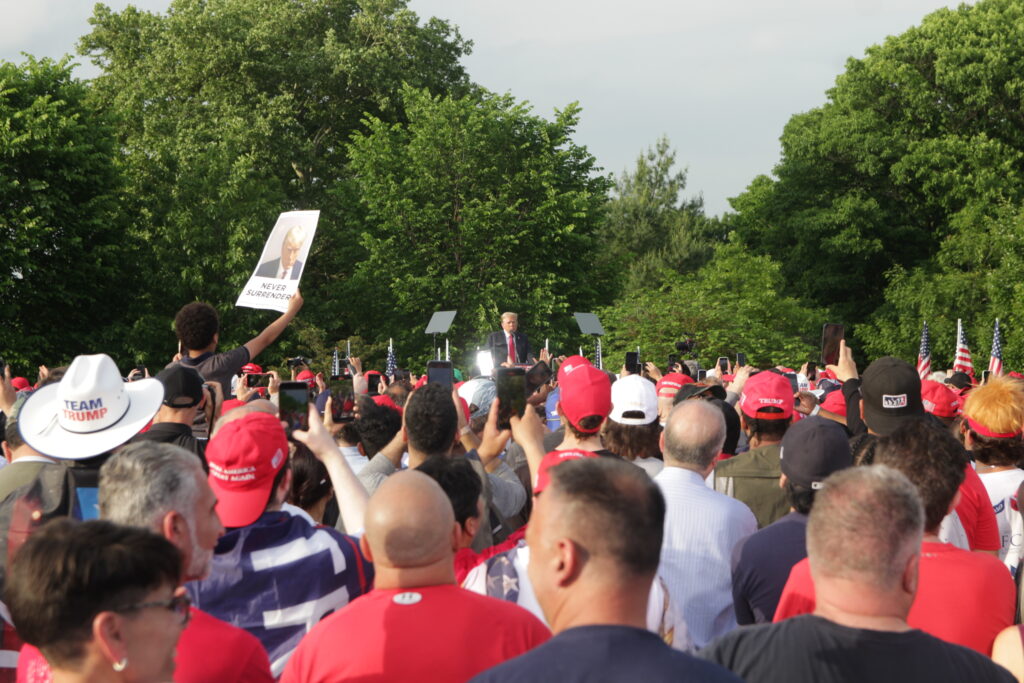
Photo by Síle Moloney
Referencing New York’s “1978/1980” subways, he asked, “Is this the representation of the strongest economy in the world?” We mentioned how parts of the subway system in Paris and London go much deeper underground, and actually date back to 1900 and 1863 respectively. Mejia then mentioned again how the Japanese rail system is much more modern and faster than in the U.S. and how delays in New York subways can last for an hour.
According to a November 2023 report published by AB7NY, data shows that the MTA subway is on time 84% of the time, with the F line experiencing the most delays in the City.
Mejia said he believed in putting America and Americans first, adding this didn’t mean not being sympathetic to others and coming to “some sort of solution.” He added in part, “I’m a Latino, myself, right? I just happen to be very lucky, and I got citizenship right? This is a democratic republic. We elect our representatives in Congress, Washington, the Oval Office. Why? Because we need them to represent the people first.”
We also spoke to rally attendee, Cleon Rowe, who [for context] was a Black, middle-aged voter from The Bronx, who has lived in Tremont Hunts Point, and on University Avenue, among other locations, and who comes from a family of Democrats. We asked him why it was important for him to attend. He said he wanted to show his support for someone who he believes is the best alternative for this year’s presidential election.

Photo by David Greene
“Before 1970, [U.S. President Jimmy] Carter signed the Community Revitalization Act [enacted in 1977], and I watched the infrastructure of The Bronx grow, while the poverty rate stayed down and the employment stayed low,” Rowe said. The law required the Federal Reserve and other federal banking regulators to encourage financial institutions to help meet the credit needs of the communities in which they did business, including low and moderate-income (LMI) neighborhoods.
“So they fixed up a lot of the property, but they did nothing for the people in here, and this was all under Democratic control,” Rowe said. “They [de]regulated the banks, and caused the banks to do the subprime crisis. A lot of people actually became homeless after buying houses because they couldn’t afford to pay because of predatory loans so again, I don’t believe that following the Democratic protocol is the best thing for my community.”
Though deregulation did begin under Democratic control of Congress with the passage of the Depository Institutions Deregulation and Monetary Control Act in 1980, in the wake of the 2007-2008 credit crisis, financial regulatory reform was also passed under former Democratic U.S. President Barack Obama in 2010, with the Dodd–Frank Wall Street Reform and Consumer Protection Act.
“We need people to understand money management and personal responsibility,” Rowe continued. “We don’t have that in this community. We don’t even have people who are aware of political perspectives in my community, and instead of trying to educate people, the Democratic Party tends to just want to utilize and manipulate people.” He said having spent time with some Conservatives, he felt they helped people be independent thinkers. “I believe there’s more independence and more financial control, more safety and security following the Republican Party so I’m here to support,” he said.
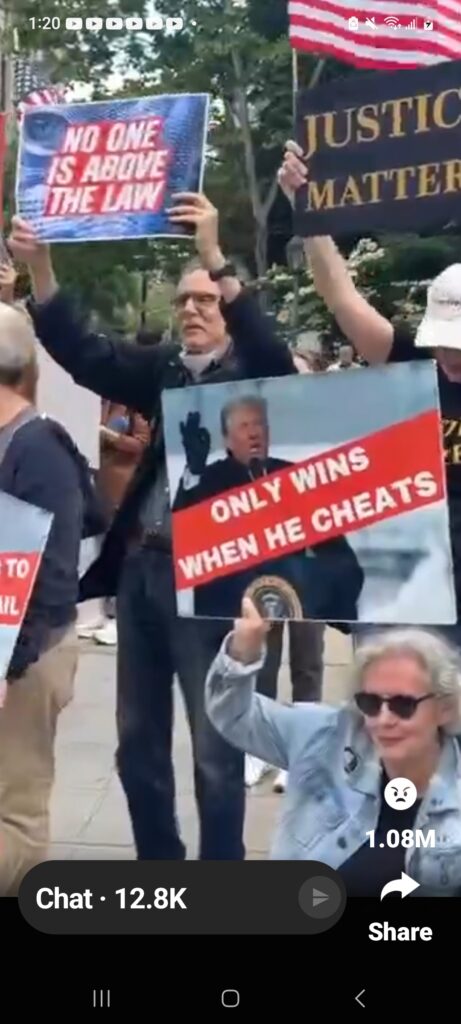
Photo courtesy of the Citizens’ App
We asked Rowe for his views on Trump’s case of falsification of business records. He said he [Rowe] was a college graduate and army veteran and he wasn’t concerned about it. “That’s [Trump’s legal troubles] outside of the scope,” he said. “What can be done with his leadership?” Rowe said there were many people in his life that had had legal problems. “Even if he’s convicted, to me, it’s not what other people are trying to bring about to destroy you, but what you’re trying to bring about to elevate other people.” he said in part.
We said if Trump were convicted, it would mean he had done something wrong and asked Rowe if he was not concerned by that. “Sure, but my thing is not the individual,” Rowe said, explaining that he was more concerned about the direction of the country since Trump, even if elected, would only be in office for four years anyway. “We still have to have an agenda that’s going to be useful for my neighborhood, local politics,” he said.
Rowe continued in part, “We have nothing but Democrats so we we can’t really get anything established here. Right now, we have too much liberalism.” He gave examples of people parking on sidewalks and added that there was no personal responsibility, too much entitlement, and a “reactive” rather than an “active” police department.
Rowe went on to say that the country had been divided before January 6th due to economic disparity. “When you have a need, you tend to become more isolated in your need, so if I only have a certain amount, then I have to look out for mine. You know I want to help the family next door, but I only have enough water for my family so the polarization is an economic concern not a political one to me. We referenced again Trump’s 2017 tax cuts which mostly benefited those on higher incomes. Rowe said his black community, the working class, were falling between the cracks.
We discussed the Democratic argument that “trickle down economics” doesn’t work. He said he knows there is the argument that if you give tax cuts to the rich, they will give themselves a bigger pay check, but argued that in his opinion continually taxing corporations raises prices and doesn’t allow corporations to create more jobs.
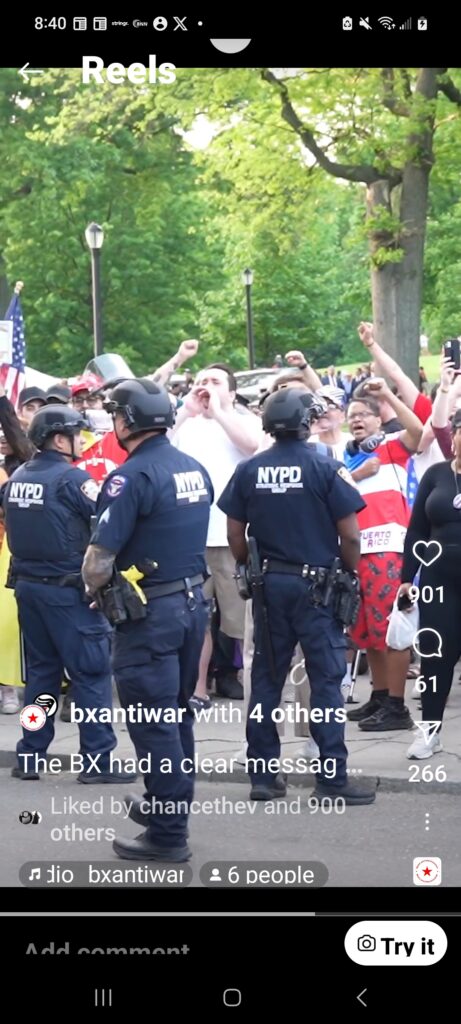
Screenshot via social media
Despite some minor confrontations between Trump supporters and counter protesters and residents, the NYPD reported no arrests after the rally. When asked, the NYPD said they did not estimate crowd sizes. Norwood News estimated around 3,000 supporters were present as we arrived and made our way to the restricted stage section. There were many more Trump supporters who were located further away from the inner stage area. Some were not from The Bronx.
Meanwhile, the FDNY reported that EMS tended to 12 patients with minor injuries at the rally, including heat exhaustion. Free water was handed out by rally organizers in the area closest to the stage. The patients included 11 civilians and one NYPD member. All except one declined further medical treatment.
Outside the rally, some supporters waving Palestinian flags were heard chanting, “Move B**ch! Get out The Bronx!” and held banners that read, “F**k Trump! F**k Biden! The people of The Bronx, we run this sh*t!”
Tom, a resident of Morris Park who attended the rally, alleged a cop told him the crowd size was 17,000 at the rally. “I don’t care if he does another 100,000 rallies,” he said of Trump. “Nothing is going to beat the Crotona Park rally. To me, that was historical, and it will never be matched.”
Read our story on the organized counterprotests to the Trump rally here.
*Fahima Degia contributed to this story.




